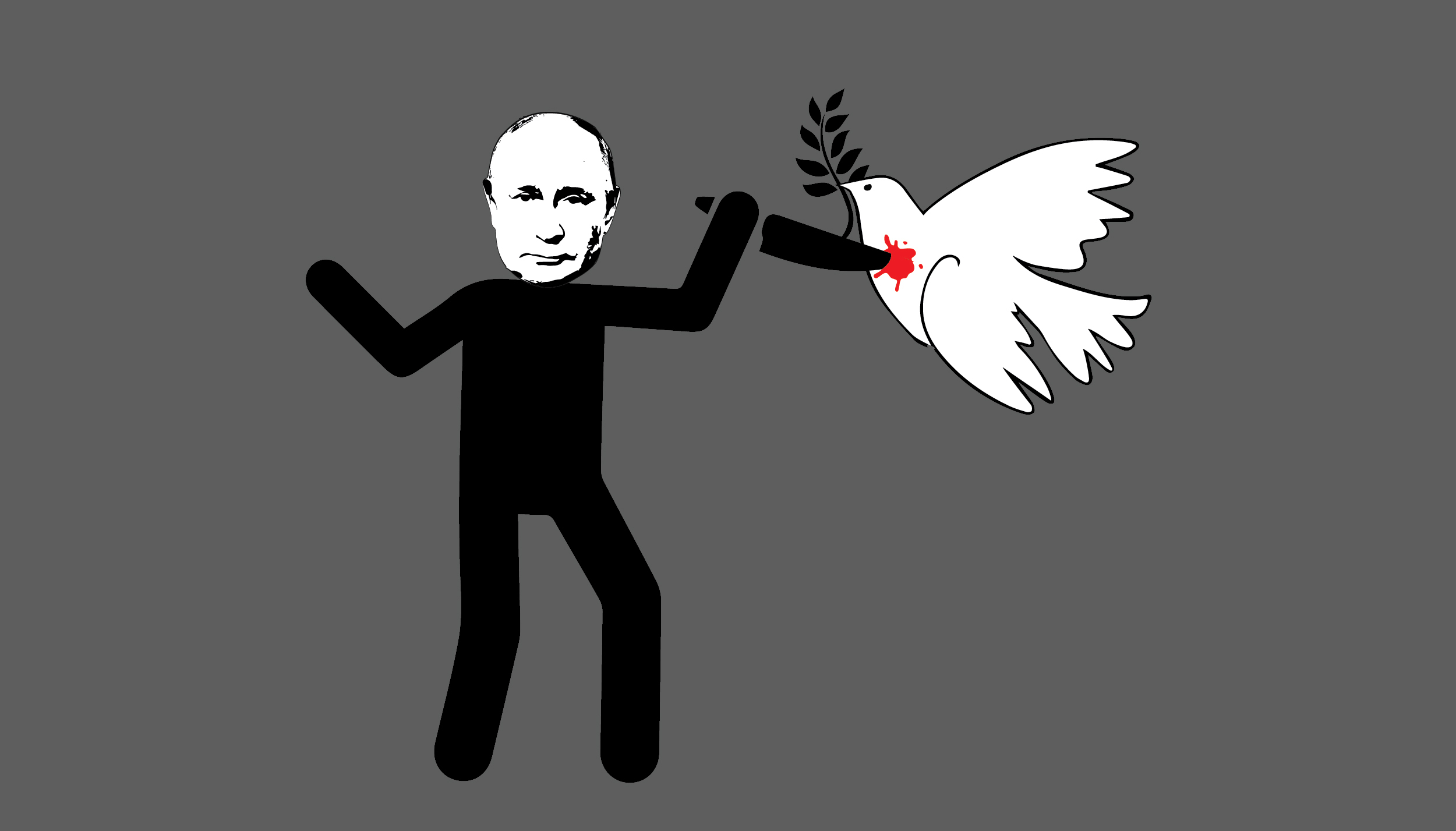

From 2014 to 2022, Ukraine engaged in 200 rounds of negotiations with Russia and signed 20 cease-fire agreements. However, according to Dmytro Kuleba, the head of the Ministry of Foreign Affairs, these efforts ultimately culminated in a full-scale Russian invasion. Following the onset of the invasion, Russia and Ukraine participated in a series of talks, with the latest occurring on March 29, 2022, in Istanbul. Some media outlets labeled these talks as "the most productive of all."
According to Mykhailo Podoliak, a member of the Ukrainian delegation, Kyiv proposed resolving issues related to Crimea and Sevastopol through bilateral negotiations between Ukraine and Russia over a 15-year period. Ukraine's proposal also included international security guarantees, similar to Article 5 of the NATO Charter, which would involve sending troops, providing weapons, and closing the sky over Ukraine in the event of a renewed Russian attack. These guarantees, however, would not extend to occupied eastern Ukraine and Crimea.
Subsequently, the Russian Ministry of Defense announced a "gesture of goodwill," intending to reduce military activity in the Kyiv and Chernihiv regions to facilitate negotiations. However, Ukraine asserted that the withdrawal was primarily due to Russia's failures in these areas.
Despite progress in negotiations, doubts remained about the potential for lasting peace. Mykhailo Podoliak noted that the recent atrocities in Bucha, Kramatorsk, and Mariupol made it emotionally challenging to engage in negotiations with Russia. President Zelensky emphasized the necessity of negotiating with Russia from a position of strength, highlighting that Russia responds more to battlefield strength than to peace talks.
In September 2022, President Zelensky expressed readiness for negotiations but ruled out direct talks with Putin. By October, Ukraine implemented the National Security Council's decision, emphasizing the impossibility of negotiating with the current Russian government.
The Russian side has accused former British Prime Minister Boris Johnson of allegedly "disrupting" the Istanbul negotiations. According to the Russian ambassador in London, Johnson visited Kyiv "at the behest of the United States" in the spring of 2022 and convinced President Zelensky to abandon peace efforts. The ambassador claimed that Johnson's intervention led to the rejection of a document already initialed by the head of the Ukrainian delegation, Arakhamia, and resulted in Ukraine intensifying its resistance (quote from ria.ru). Boris Johnson refuted these allegations, dismissing them as "delusional." To support their claims, Russian propagandists cited David Arakhamiya's remarks in an interview with Natalia Moseychuk, where he mentioned that Johnson proposed a confrontational approach rather than accepting Russia's terms. This analysis delves into David Arakhamiya's statement, Boris Johnson's response, and the agitprop reaction to the situation.
In March 2024, The Wall Street Journal published a draft peace agreement dated April 15, 2022. According to the document, Ukraine was permitted to join the EU but had to maintain neutrality and refrain from joining military alliances like NATO. Kyiv was prohibited from receiving foreign military assistance, and its Armed Forces were to be limited in terms of personnel and weaponry. Comparing these figures with Military Balance indicators for 2022 suggests a significant reduction in Ukraine's military capabilities. The agreement also stipulated the retention of Crimea by Russia, lifting Western sanctions, and ignoring investigations into Russian war crimes. The use of the Russian language was to be equal to Ukrainian in official contexts. Guarantors included Great Britain, China, France, and the United States, with Russia possibly being added as a guarantor. However, the agreement lacked clear implementation mechanisms, and Russia's potential role as a guarantor raised concerns about its ability to block actions under the agreement in case of renewed aggression against Ukraine. The published draft resembled terms of surrender for Ukraine rather than a genuine peace agreement, providing Russia the opportunity to launch future aggression against a weakened Ukraine with impunity.
As noted by the Ukrainian Ministry of Foreign Affairs, Ukraine did not agree to the terms proposed during the Istanbul negotiations. This analysis underscores Russia's manipulation of peace scenarios, revealing Putin's reluctance to discuss anything beyond Ukraine's surrender.
Korea: "everything is going according to plan" of Moscow?
As early as March 2022, the head of the Main Directorate of Intelligence, Kyrylo Budanov, assumed that Russia would try to impose a "Korean" scenario on Ukraine in order to gather all the occupied territories into a single quasi-state entity: "After the failures near Kyiv and the impossibility of overthrowing the central government of Ukraine, Putin is already changing the main operational directions are south and east. There are reasons to believe that he is considering a "Korean" scenario for Ukraine. That is, he will try to impose a dividing line between the unoccupied and occupied regions of our country. In fact, this is an attempt to create North and South Korea in Ukraine. After all, he is definitely not capable of swallowing the entire state." However, already in September 2022, Moscow resorted to the annexation of the occupied territories, rather than the formation of a controlled quasi-state on them.
The Korean Peninsula was divided into North and South Korea along the 38th parallel from 1945 to 1950, and from 1953 along the Military Demarcation Line. The sides were exhausted by the three-year war — the large number of casualties and destroyed infrastructure did not justify further military competition — so they agreed on a ceasefire and a demarcation line. Analogies with Korea in the case of Ukraine are not entirely appropriate, because we are dealing with an aggressor (Russia), which is trying to seize more and more Ukrainian territories.
In the fantasies of Russian agitprop, in particular, the English-language article of TASS reads that the "Korean scenario" is the only way out for Ukraine. They said, the territory of Ukraine under Kyiv's control is not able to "attract" the territories stolen by Russia, as happened with Germany, when its eastern part sought to join the western part at the end of the 20th century, so there is nothing left but to repeat "Korea". It seems that the situation at the front is deadlocked, so the separation of the southern and eastern regions is presented as a given without an alternative. In order to strengthen their arguments, the propagandists refer to Andreas Kluth, a Bloomberg columnist often quoted in the Russian media, who analyzes the experience of Korea and highlights lessons for Ukraine in his column.
“If Korea is the right model, the lesson is that combatants take far too long to begin talking even after it’s obvious that neither side can win militarily and then far too long to silence the guns once it’s clear that the outcome won’t change, and that the only parameter left is how many people will unnecessarily die until that’s acknowledged. None of this is about who’s right; history will record that one man, Vladimir Putin, is guilty of the disaster unfolding in Ukraine. But the wisdom of the past suggests that the time has come to fight and talk at the same time — not in the hope of scoring any sort of victory, but in the resignation that, somehow, this horror must end,” reads the article.
The propagandists of Sputnik Africa and RT have mentioned the "Korean scenario" in reference to a column by James Stavridis, the former Commander-in-Chief of NATO's combined armed forces in Europe from 2009 to 2013. Stavridis's actual message may differ from how Russian propaganda interprets it.
The military identifies three key lessons from the Korean situation that could apply to Ukraine: securing funding for reconstruction promptly, establishing genuine and enduring security assurances, and being prepared to engage in negotiations for a "land for peace" agreement. While these lessons present a realistic path to success for Ukraine, the ultimate decisions should be made by the Ukrainian people themselves.
In a likely scenario, Stavridis suggests that Moscow might be willing to halt aggression against Ukraine in exchange for some form of legitimization of the occupied territories. However, history shows that Putin's aggression extends beyond mere territorial control, with ongoing attempts to expand land grabs and inflict harm on Ukrainian civilians. The term "Korean scenario" is often misused by propaganda to suggest a peaceful resolution without considering other critical factors, such as halting Kremlin aggression altogether.
It is important to recognize that achieving peace and stability requires a comprehensive approach that addresses all aspects of the conflict, including the cessation of hostile actions by the Kremlin. Simply adopting elements of the "Korean scenario" without addressing broader aggression issues may not lead to lasting peace for Ukraine.
"Finlandization" as a euphemism for neutrality
"Finlandization" is a term used to describe a situation where a smaller nation, due to necessity or external pressure, adopts a neutral stance in international affairs to maintain stability and avoid conflict with a larger neighboring country. This neutrality often comes at the cost of sacrificing some degree of sovereignty and decision-making independence. Historically, "Finlandization" was based on treaties between the USSR and Finland, such as the "On Cooperation and Mutual Assistance" treaty from 1948, which compelled Helsinki to adopt a neutral foreign policy and refrain from joining alliances like NATO. This arrangement allowed the USSR to influence Finnish foreign policy decisions.
Russian propaganda, as seen in the Sputnik article, simplifies "Finlandization" as Finland's neutral stance during the Cold War. The narrative suggests that Finland's period of neutrality under "Finlandization" brought peace, prosperity, and democracy, implying that neutrality in the face of aggression is an effective strategy.
It is essential to recognize that while neutrality can sometimes prevent conflict, it also comes with limitations and compromises on a nation's autonomy and international relationships. The context and specific circumstances of each situation must be carefully considered when evaluating the effectiveness and implications of adopting a neutral position in international affairs.
Before the full-scale invasion, Western partners, including French President Macron, reportedly considered the "Finnish scenario" as a potential de-escalation strategy, as mentioned in The New York Times. However, this approach failed to pacify the aggressor, highlighting its ineffectiveness. Currently, there is little serious discussion about Ukraine adopting neutrality or rejecting Euro-Atlantic integration to halt aggression. In fact, Ukraine amended its Constitution in 2019 to align with its aspirations for full NATO membership. Embracing "Finlandization" would contradict the Constitution and the desires of the majority of Ukrainians, with 77% of respondents in a survey by the sociological group "Rating" supporting Ukraine's NATO accession.
Following Stalin: Yalta-2
Following the historical narrative of Yalta, the Russian occupiers attempt to leverage certain historical events, portraying them as their triumphs. One such event is the Yalta Conference of February 4-11, 1945, where leaders from Great Britain, the United States, and the Soviet Union met to discuss post-war global influence and territorial arrangements after the defeat of Nazi Germany and other Axis powers.
The Kremlin seeks to associate itself with this historical narrative, particularly through its proxies in occupied Crimea. In 2023, Crimean officials began touting Crimea as a potential center of world politics once again. Local media in Crimea have even speculated about a "Yalta Conference 2.0," pondering whether Crimea could play a role in halting global conflicts. These narratives serve the Kremlin's agenda of projecting power and influence on the international stage.
In 2020, Putin penned an article for the American magazine National Interest, commemorating the 75th anniversary of Victory in the Second World War. In this article, Putin essentially called upon Western leaders to convene and negotiate the division of spheres of influence, akin to the arrangements made during the Yalta Conference in 1945. He emphasized that the key historical achievement of Yalta and similar decisions was establishing a mechanism for major powers to resolve differences diplomatically.
Putin's rhetoric in 2020 advocating for diplomacy sharply contrasts with his actions in 2022, where he demonstrated "diplomacy in resolving differences" through a full-scale invasion of Ukraine. This stark shift exposes the hypocrisy and manipulation inherent in Putin's approach.
The nostalgia for historical events and attachment to significant dates serves as a characteristic tactic of occupiers. They use the guise of promoting peace and stability to maintain the status quo in war-torn regions and ultimately expand their territorial claims. Putin's exploitation of historical narratives and selective memory underscore the manipulative nature of such strategies.
The Kremlin's ultimate objective is the capitulation of Ukraine
An examination of the various "agreement scenarios" propagated by the Kremlin reveals that Russia's goal is not genuine dialogue for peace but rather seeking concessions to fuel further escalation. Ukraine, despite signing the unfavorable "peace agreements" Minsk-1 and Minsk-2, understood this reality. Even one of the architects of "Minsk-2," Russian presidential aide Vladyslav Surkov, admitted that Moscow never intended to abide by the agreement, designing it to be unimplementable. Thus, even if Ukraine were to agree to terms like "Finlandization," the "Korean scenario," or a conditional "Yalta-3," there is no guarantee that Russia would honor its peace obligations. The ongoing hostilities underscore Putin's unwillingness to entertain any scenario apart from Ukraine's surrender.
Putin's public statements reinforce this stance. When discussing peace initiatives, Putin remarked that negotiations were favored not because of a shortage of enemy ammunition but due to Russia's strategic interests and the situation on the ground. His assertion that negotiations are impossible when Ukraine runs out of ammunition exposes the cynical calculus of exploiting Western hesitance to provide military aid to Ukraine.
However, certain Western leaders and cultural elites grasp Putin's true objectives. German Chancellor Olaf Scholz rejected calls to limit military aid to Ukraine, noting that negotiating under duress is futile except for capitulation. Similarly, an open letter signed by representatives from scientific and cultural circles, including Nobel laureates, warns against appeasing the aggressor. They emphasize the urgent need to bolster aid to Ukraine to enable it not just to survive but to prevail. This stance rejects the tragic history of appeasement, such as the Munich Agreement of 1938, and advocates for a firm stance against aggression.


